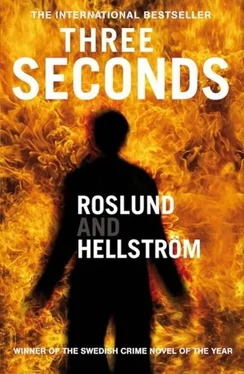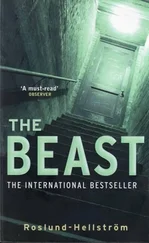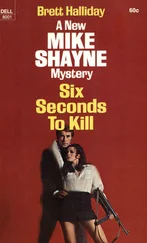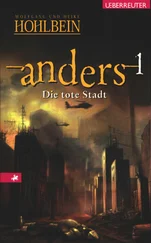Piet Hoffmann was dangerous.
Piet Hoffmann knew the truth about a murder that was less important than continued infiltration.
When Grens identified Hoffmann's name on the periphery of the investigation and wanted to question him, he became even more dangerous.
They had burned him.
But he had survived an attack, taken hostages, and positioned himself where he was visible in a workshop window.
You recorded the meeting. You sent it to me. The man who had to decide on your death.
Ewert Grens parked on Fredsgatan close to the dark building from where Sweden was governed. He would soon make his way in there. He had just listened to a meeting that had been recorded in one of its many senior offices twenty-one days ago.
He got out his mobile phone and dialed Sven Sundkvist's number. Three rings. Someone coughed and struggled to find strength.
"Hello?"
"Sven, it's me. I want-"
"Ewert, I'm asleep. I've been asleep since eight. We missed out on last night, remember?"
"You're not going to get much more sleep tonight either. You're going to go to the USA, to south Georgia. Your plane leaves Arlanda in two and half hours. You'll arrive-"
"Ewert."
Sven had pulled himself up, his voice was stronger-it was probably easier to talk when your chest and airways were free of pillows and duvets. "What are you talking about?"
"I want you to get up and get dressed, Sven. You're going to meet Erik Wilson and you're going to get him to confirm that a meeting I've now listened to actually rook place. I'll call you in a couple of hours. By that time, you'll be sitting in a taxi and you'll have listened to the sound file that I've forwarded to your computer. You'll understand exactly what this is all about."
Grens cut the engine and got out of the car.
The doors to power were made of glass and had opened automatically whenever he had been there during the day. Now they remained closed and he had to press a bell to wake the security guard one floor up.
"Yes?"
"Detective Superintendent Grens, City Police. I'm here to look at some of your surveillance camera footage."
"Now?"
"Do you have anything else to do?"
Some rustling papers near the microphone made the speaker crackle. "Did you say Grens?"
"You can see me in the camera. And now you can see the ID that I'm holding up."
"No one said you were coming. I want to see it again properly when you're in here with me. Then I'll decide whether you can stay or whether I'd rather you came back tomorrow."
Ewert Grens accelerated, the E18 north of Roslagstull was almost empty and right now he didn't give a damn about signs that limited the speed to seventy kilometers an hour.
He had first checked the security company's signing-in book.
The state secretary of the Ministry of Justice had had a total of four visitors on the tenth of May. They had arrived separately within twenty-five minutes of each other. First the national police commissioner, then Göransson, a bit later Erik Wilson, and finally, in handwriting that was difficult to read, Grens and the security man were eventually convinced that the visitor who had signed in at 15:36 was Pier Hoffmann.
He passed Danderyd, Taby, Vallentuna… for the third time in twenty-four hours he was approaching the small town of Aspsås, but he wasn't going to the prison or the church, he was going to a terraced house and a man he would not leave until he had answered the one question that Grens had come to ask.
With the signing-in book in his hand, Ewert Grens had demanded to see footage from two of the cameras that watched over the Government Offices and every person passing in or out. He had identified them one by one. First when they signed in, the camera was above the security desk in the entrance to Rosenbad and they stood there, all four of them, without looking up. Then a camera at face level in a corridor on the second floor opposite the door to the state secretary's office. He had seen the national police commissioner and Göransson knock on the door and go in, within a couple of minutes of each other. Wilson had arrived twenty minutes later and Hoffmann had sauntered down the corridor about seven minutes after that. He had known exactly where the camera was and twigged it early, looked into it for a bit too long, looked into the lens aware that his presence had been documented.
Piet Hoffmann had knocked on the door just like all the others but had not been let in immediately like them. He was instructed to stay in the corridor, to hold out his arms while Göransson frisked him. Grens found it hard to stand still when he realized that the loud noise he had heard about nine minutes into the recording was the chief superintendent's hand knocking the microphone.
He was speeding and slammed his foot on the brake when the turn to Aspsås emerged from the dark.
A couple more kilometers; he wasn't laughing yet, but he was smiling.
Sunday was only a few hours old. He didn't have much time but he would manage, still more than twenty-four hours left until Monday morning, when the security company's report of the weekend's surveillance tapes was passed on to the Government Offices' security department.
He had heard the voices, and now he had seen pictures as well.
He would shortly confirm the connection between three of the meeting participants and the orders that a prison chief warden had been given before and during a hostage drama that ended in death.
A terraced house on a terraced house road in a terraced house area.
Ewert Grens parked the car in front of a mailbox with the number fifteen on it and then sat there and looked at the silence. He had never liked places like this. People who lived too close to each other and tried to look alike. In his big apartment in Sveagatan, he had someone walking on his ceiling and someone else standing under his floor and others who drank glasses of water on the other side of the kitchen wall, but he didn't see them, didn't know them; he heard them sometimes but he didn't know what they were wearing, what kind of car they had, didn't have to meet them in their dressing gown with the newspaper under their arm and didn't need to think about whether their plum tree was hanging a little too low over the fence.
He could hardly stand himself.
So how the hell was he going to stand the smell of barbecued meat and the sound of footballs on wooden doors?
He would ask Sven later, when this was all over, how you do it, how you talk to people you're not interested in.
He opened the door and got out into an almost balmy spring night. A couple of hundred meters away stood the high wall, a sharp line against the sky that refused to go dark and would continue to do so until yet another summer had turned into early autumn.
Square slabs in a well-trimmed lawn. He walked up to the door and looked at the windows that were lit both downstairs and up: probably the kitchen, probably the bedroom. Lennart Oscarsson lived the other side of his life only a few minutes' walk from his workplace. Grens was sure that being able to cope with living in a terraced house was somehow connected CO not needing to separate one reality from the other.
His intention was to surprise. He hadn't phoned to say he was coming, had hoped to meet someone who had just been asleep and therefore didn't have the energy to protest.
It wasn't like that.
"You?"
He remembered Hermansson's description of a person on the edge. "What do you want?"
Oscarsson was wearing the prison uniform.
"So you're still working?"
"Sorry?"
"Your clothes."
Oscarsson sighed.
"In that case I'm not alone. Unless you've come here in the middle of the night to have some tea and help me with the crossword?"
"Will you let me in? Or do you want to stand out here and talk?"
Читать дальше












